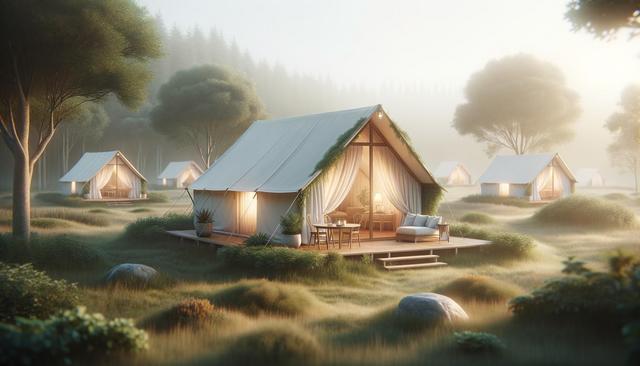Why Tent Homes Are Gaining Popularity
In recent years, tent homes have emerged as a practical and appealing solution for those seeking an affordable and minimalist lifestyle. With housing prices continuing to rise in many parts of the world, people are turning to alternative living options that offer both financial freedom and flexibility. Tent homes fit this need perfectly, offering a structure that’s not only cost-effective but also easy to set up and maintain.
One reason for their growing appeal is the shift in mindset toward simpler, more intentional living. Many individuals are choosing to downsize and prioritize experiences over possessions. Tent homes provide a unique opportunity to live closer to nature, reduce household expenses, and minimize one’s environmental footprint. This trend isn’t limited to outdoor enthusiasts or off-grid adventurers—urban dwellers are also exploring tent homes as backyard studios, guest spaces, or even primary residences in areas where zoning allows.
Affordability Without Compromising Comfort
One of the most compelling advantages of tent homes is their affordability. Compared to traditional brick-and-mortar houses, tent homes require a fraction of the investment. This makes them an accessible option for people from various economic backgrounds, including students, retirees, and digital nomads. Additionally, many tent home models come with customizable features that allow for comfort without breaking the bank.
Common features of modern tent homes include:
- Weather-resistant materials for year-round use
- Insulated walls and flooring for temperature control
- Modular interiors that can be configured for sleeping, cooking, and storage
- Solar panel compatibility for off-grid energy solutions
These features allow residents to enjoy a surprisingly comfortable lifestyle while maintaining low living costs. Maintenance is also simpler and less expensive, contributing to the long-term affordability of tent living.
Eco-Friendly Living with Tent Homes
Environmental sustainability is another major draw of tent homes. Constructed with lightweight and often recyclable materials, these homes typically have a much smaller carbon footprint than conventional housing. The reduced need for heating and cooling, combined with potential solar energy integration, makes tent homes an ideal choice for eco-conscious individuals.
Moreover, tent homes encourage a lifestyle that values resource efficiency and minimal waste. Living in a smaller space naturally leads to more mindful consumption habits. People who choose this lifestyle often report a greater appreciation for the essentials and a stronger connection to nature. Some tent home communities even promote shared resources, such as communal kitchens or gardens, further enhancing sustainability.
Key environmental benefits include:
- Lower energy consumption
- Reduced water usage
- Minimal land disturbance compared to traditional foundations
- Potential for composting toilets and greywater systems
Versatility for Different Lifestyles
One of the strengths of tent homes is their adaptability to various lifestyles and needs. Whether you’re a solo traveler, a couple seeking a quiet retreat, or a family looking for a weekend getaway, there’s a tent home configuration that can work for you. These structures can serve as:
- Primary residences
- Vacation homes or cabins
- Emergency or temporary housing solutions
- Remote workspaces or studios
The portability of tent homes adds another layer of flexibility. Unlike permanent homes, tent homes can often be relocated without major logistical efforts. This is particularly beneficial for people who enjoy seasonal living or have jobs that require frequent relocation. Their modular nature also allows for easy expansion or downsizing depending on changing needs.
Communities are beginning to recognize the potential of tent homes in addressing housing shortages. Some municipalities are experimenting with zoning laws and building codes to accommodate these alternative dwellings, making it easier for people to legally live in or rent out tent homes.
Considerations Before Choosing a Tent Home
While tent homes offer many advantages, they also come with unique considerations. It’s important to assess your specific needs, climate conditions, and local regulations before committing to this lifestyle. For instance, not all tent homes are designed for extreme weather, so understanding the specifications of each design is crucial.
Before investing in a tent home, consider the following:
- Legal zoning and land use regulations in your area
- Availability of utilities and alternative systems like solar power or composting toilets
- Long-term maintenance and material durability
- Security and insulation needs based on your location
It’s also worth exploring whether a tent home is a temporary or long-term solution for you. Some people use them as a stepping-stone toward building a more permanent home, while others embrace the lifestyle indefinitely. Consulting with professionals or joining online communities can provide valuable insights and help you make an informed decision.
A Minimalist Path to Affordable and Conscious Living
Tent homes represent a growing movement toward affordable, sustainable, and flexible housing. As more people seek alternatives to the high costs and environmental impacts of traditional homes, tent homes offer a practical and inspiring solution. Whether you’re looking to simplify your lifestyle, reduce your ecological footprint, or explore a new way of living, tent homes provide a compelling option worth considering.
By embracing minimalist principles and thoughtful design, tent homes empower individuals to live with greater freedom and purpose. With careful planning and the right resources, this form of housing can be more than just a trend—it can be a meaningful shift toward a more sustainable and fulfilling way of life.


